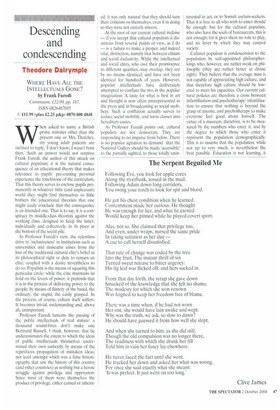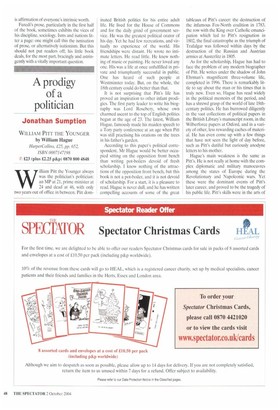Descending and condescending
Theodore Dalrymple
WHERE HAVE ALL THE INTELLECTUALS GONE?
by Frank Furedi Continuum, £12.99, pp. 167, ISBN 0826467695 ct) £11.99 (plus £2.25 p&p) 0870 800 4848 When asked to name a British prime minister other than the present one or Mrs Thatcher, my young adult patients are inclined to reply, 'I don't know, I wasn't born then.' Such an answer would not surprise Frank Furedi, the author of this attack on cultural populism; it is the natural consequence of an educational theory that makes relevance to pupils' pre-existing personal experience the touchstone of the curriculum. That this theory serves to enclose pupils permanently in whatever little (and unpleasant) world they might find themselves so little bothers the educational theorists that one might easily conclude that the consequence is an intended one. That is to say, it is a conspiracy by middle-class theorists against the working class, designed to keep the latter, individually and collectively, in its place at the bottom of the social pile.
In Professor Fur&li's view, the relentless drive to 'inclusiveness' in institutions such as universities and museums arises from the loss of the traditional cultural elite's belief in its philosophical right or duty to remain an elite, coupled with a desire nevertheless to do so. Populism is the means of squaring this particular circle: while the elite maintains its hold on the levers of power, it pretends that it is in the process of delivering power to the people, by means of flattery of the banal, the ordinary, the stupid, the easily grasped. In the process, of course, culture itself suffers. It becomes trivial, undemanding and, above all, unimportant.
Professor Furedi laments the passing of the public intellectuals of real stature: a thousand sound-bites don't make one Bertrand Russell. I think, however, that he underestimates the extent to which the ideas of public intellectuals themselves undermined their own authority by means of the repetitious propagation of mistaken ideas, not least amongst which was a false historiography that saw the history of this country (and other countries) as nothing but a heroic struggle against privilege and oppression. Since most of them were themselves the product of privilege, either earned or inherit
ed, it was only natural that they should turn their criticism on themselves, even if in doing so they were not entirely sincere.
At the root of our current cultural malaise — if you accept that cultural populism is disastrous from several points of view, as I do — is a failure to make a proper, and indeed vital, distinction, namely that between elitism and social exclusivity. While the intellectual and social elites, who owe their prominence to different qualities, may overlap, they are by no means identical, and have not been identical for hundreds of years. However, populist intellectuals have deliberately attempted to conflate the two in the popular imagination. A taste for what is best in art and thought is now often misrepresented in the press and in broadcasting as social snobbery. Such a conflation actually serves to reduce social mobility, and turns classes into hereditary castes.
As Professor Furedi points out, cultural populists are not democrats. They are responding to no impulse from below. There is no popular agitation to demand that the National Gallery should be made 'accessible' to the partially sighted, to those totally unin
terested in art, or to Somali asylum-seekers. That it is free to all who wish to enter should be enough: but for the cultural populists, who also have the souls of bureaucrats, this is not enough; for it gives them no role to play, and no lever by which they may control society.
Cultural populism is condescension to the population by self-appointed philosopherkings who, however, are rather weak on philosophy (they are rather better at divine right). They believe that the average man is not capable of appreciating high culture, and that therefore high culture should be lowered to meet his capacities. Our current cultural policies are therefore a cross between infantilisation and psychotherapy: infantilisation to ensure that nothing is beyond the grasp of anyone, and psychotherapy to make everyone feel good about himself. The virtue of a museum, therefore, is to be measured by the numbers who enter it, and by the degree to which those who enter it represent the population demographically. This is to assume that the population, while not up to very much, is nevertheless the best possible. Education is not learning, it is affirmation of everyone's intrinsic worth.
Furedi's prose, particularly in the first half of the book, sometimes exhibits the vices of his discipline. sociology. Isms and isations litter a page: one might call this the ismisation of prose, or alternatively isationism. But this should not put readers off; his little book deals, for the most part, bracingly and astringently with a vitally important question.



















































































 Previous page
Previous page